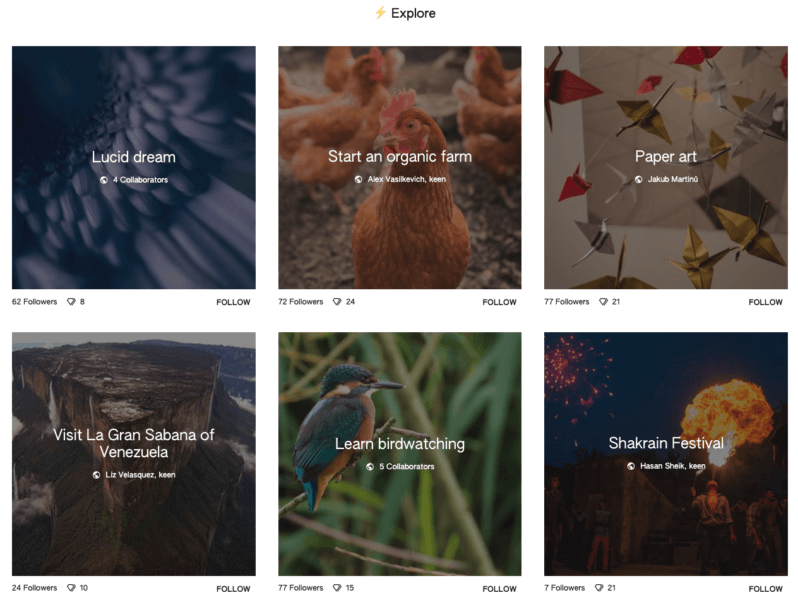To the extent that tech pundits continue to compare Google’s new Keen search and social discovery site to Pinterest, and users also think of it that way, it’s probably destined to fail. Google famously doesn’t promote and ultimately shutters most of these “experiments.”
Need to get away from Pinterest. For Keen to survive, let alone succeed, Google will need to reframe and differentiate it from Pinterest — as a tool for persistent, personalized search and as a broad content repository for later consumption. It recalls the days of personal start pages and personalized content archives like iGoogle and Yahoo’s MyWeb and MyYahoo or Mozilla’s newer Pocket, which I’ll get to in a bit.
Keen was developed by Google’s Area 120 group. It was created in conjunction with Google’s People and AI Research team, “dedicated to human-centered machine learning systems,” project co-founder CJ Adams wrote in an inaugural blog post.

Gems, explore, searches. Users who visit Keen for the first time are presented with a grid of public topics to explore. You can save any of the individual “results” in a “keen” (each topic is a keen) or create new ones, which are based on a collection of persistent search queries supported by machine learning. Content may be shared or entirely private.
There are three sections for any given keen: “gems,” “explore” and “searches.” Gems contains all your saved results, explore offers new or updated results tied to search queries, which are featured in the “search” section and can be updated or edited. New updates will also, if users choose, be pushed in email twice a week.
The problem Keen is trying to solve is twofold: get out from under all the “feeds” and focus more on your interests, or shared interests for couples and groups. This is what Adams says in his post announcing Keen:
“What are we doing?” my wife asked as we both looked up from our phones one evening. We’d been browsing feeds of posts, images and news for hours on end, mindlessly filling the gaps between work and sleep. “This is our one precious life,” she told me . . .
That week, we started collecting some of the things that brought us joy and shared them with each other . . . we found that collecting related ideas, links and resources together gave us a way to spend more time on our shared passions in real life.

Search tools and machine learning behind the scenes. While that sounds pretty darn Pinteresty, Google is employing the tools it uses for search, news and its discover feeds to power the site. In a way that makes it yet another group of feeds, but it sits at the nexus of search and discovery. And while it’s not immediately as visually compelling as Pinterest, it has potential and potentially broader uses.
Most people have long forgotten about personal startpages and some of the personal content archives and social bookmarking tools that existed (e.g., MyWeb, del.icio.us) more than a decade ago. Pocket by Mozilla is one such application today; on a more basic level so is Safari’s reading list. There’s simply too much content to consume and act on in real time. So the ability to capture and organize it for later reference is really valuable.
Keen has an opportunity to be a personalized search site and content archive for topics, both serious and fun, that people care about. Pinterest does a great job being a source of ideas and a way to collect images and information for projects, planning and purchases. Keen could and should offer broader use cases to escape the Pinterest comparison, which will limit adoption of the site. (“I’ve got Pinterest, why do I need this?”)
Social data and ads. Google has taken many unsuccessful runs at developing social networks over the years: Orkut, Dodgeball, Latitude, Buzz, Google+ and others. (YouTube was early on seen as a social network but it’s not really used that way.) Keen is another site with social features, but it doesn’t rely on social sharing or curation to succeed. It could successfully be used by isolated individuals and work equally well.
However, if one were to be cynical, one could argue that part of Google’s motivation with Keen is capturing social data, preferences and interests. Those could then be used for personalization of ads and content across Google’s network or to understand audience interests for other types of ad targeting. Should Keen survive and grow, it would be yet another place to put native/contextual display advertising.
Why we care. Keen has potential, including potential for marketers should it succeed. But Google will need to devote some energy and marketing resources to letting people know about it and how to use it — or like so many similar efforts before it, it will wither and die on the vine.
http://feeds.searchengineland.com/~r/searchengineland/~3/XbXeaFJ06XM/google-launches-keen-a-new-personalized-search-discovery-social-mashup-336233


